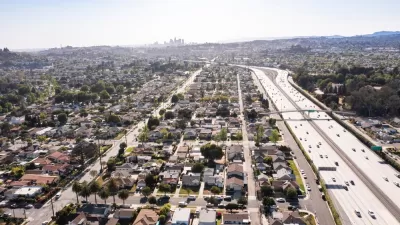A study of CEQA litigation revealed widespread abuse that experts say undermines California's environmental sustainability goals.
In August, law firm Holland & Knight released an updated comprehensive study of lawsuits filed under the California Environmental Quality Act from 2010-2012.
The report’s authors say their findings debunk the common wisdom that CEQA litigation is advanced primarily by environmentalists, or even that it serves primarily environmental purposes. In fact, the opposite may be true.
Some of the discoveries supporting this conclusion may be surprising:
- Among infrastructure projects, transit—not highways or roads—is most frequently challenged.
- Renewable energy projects are the most often challenged utility/industrial projects.
- And in the private sector, higher-density housing is most contested. Infill projects in general appear to attract challenges far more often than “greenfield” development, or sprawl.
Report co-author Jennifer Hernandez summarizes the takeaway in The Planning Report:
“CEQA litigation is not a battle between ‘business’ and ‘enviros’ … [It] is primarily the domain of Not In My Backyard (NIMBY) opponents and special interests such as competitors and labor unions seeking non-environmental outcomes.”
If CEQA is generally regarded as the province of environmentalism, then calls for CEQA reform are sometimes seen as threatening progressive goals. But Hernandez argues that moderate reforms aimed at transparency and consistency would advance sustainability and equity in the state by curbing abuse of the well-intentioned statute.
Hernandez summarized the report and her proposals in The Planning Report.
FULL STORY: New CEQA Study Reveals Widespread Abuse of Legal Process by ‘Non-Environmentalists’

Maui's Vacation Rental Debate Turns Ugly
Verbal attacks, misinformation campaigns and fistfights plague a high-stakes debate to convert thousands of vacation rentals into long-term housing.

Planetizen Federal Action Tracker
A weekly monitor of how Trump’s orders and actions are impacting planners and planning in America.

In Urban Planning, AI Prompting Could be the New Design Thinking
Creativity has long been key to great urban design. What if we see AI as our new creative partner?

King County Supportive Housing Program Offers Hope for Unhoused Residents
The county is taking a ‘Housing First’ approach that prioritizes getting people into housing, then offering wraparound supportive services.

Researchers Use AI to Get Clearer Picture of US Housing
Analysts are using artificial intelligence to supercharge their research by allowing them to comb through data faster. Though these AI tools can be error prone, they save time and housing researchers are optimistic about the future.

Making Shared Micromobility More Inclusive
Cities and shared mobility system operators can do more to include people with disabilities in planning and operations, per a new report.
Urban Design for Planners 1: Software Tools
This six-course series explores essential urban design concepts using open source software and equips planners with the tools they need to participate fully in the urban design process.
Planning for Universal Design
Learn the tools for implementing Universal Design in planning regulations.
planning NEXT
Appalachian Highlands Housing Partners
Mpact (founded as Rail~Volution)
City of Camden Redevelopment Agency
City of Astoria
City of Portland
City of Laramie





























